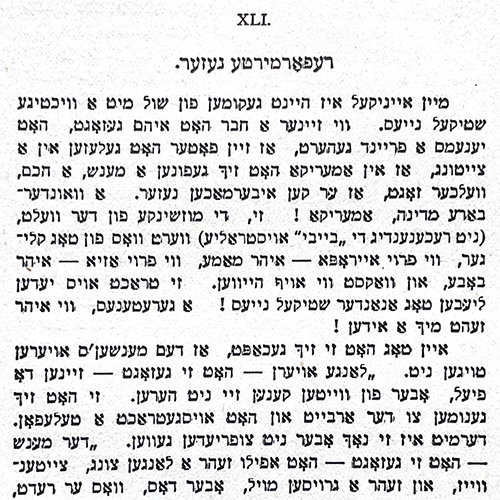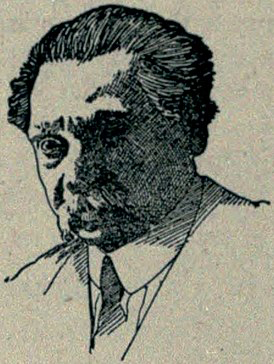Explore Feuilletons
Reformed Noses
Item sets
Abstract
Title (English)
Title (original)
Title (transliterated)
Date Issued
Place issued
Author
Newspaper
Language
Content type
Translator
Contributor
Copyright status
Keywords
Original Text
Translation
Morris Winchevsky, “Reformed Noses,” 1890. Translated by Vivi Lachs1
My grandson came home from school today with an important piece of news. A friend of his told him that one of his other friends heard that his father had read in the paper that some clever bloke in America said that he had found a way to reshape noses. What an amazing place America is! The world’s youngest daughter (if you don’t include the “baby,” Australia) gets cleverer by the day, like her mother, Mrs. Europe, and her grandmother, Mrs. Asia, and she’s growing in leaps and bounds. Every single day America thinks up something else new! A real success story, as sure as I am a Jew!
One day America realised that human ears weren’t good enough. “There are loads of big ears,” America said, “but they can’t hear anything at a distance.” So they got down to work and invented a telephone. But not completely happy with that, America said: “Human beings have got really long tongues and very big mouths, but what they say, can only be heard when they say it, and no later.” Again they got down to the task and came up with a gramophone. Now, America is starting on noses.
* * *
As my grandson says, the plan is not to make noses better at smelling (in this respect the Yankees don’t need better noses) but to make noses more attractive. The nose reformer says he can make flat noses prominent and protruding noses flatter; he can make long noses short and short noses long; he can make pointy noses rounder, and noses that look like squashed potatoes a bit pointier; he can make wide noses narrower and narrow noses wider; he can make milky-white noses redder, and ruddy noses paler. To sum up, he is a sort of magician who can make your nose look however you like.
* * *
I don’t know if you’ve heard of Cleopatra’s nose or the nose of Napoleon the First, and many other famous historical noses, but I’ve just been thinking about them. Take Napoleon, for instance: he always chose men with big long noses for his generals and liked people with long noses above all. Surely you must have heard of the Duke of Alba’s nose: that was the kind Napoleon really liked. It could be that Napoleon, who wanted to lead the world by the nose, liked that sort of nose because you can grip it more easily with your hand.
* * *
Then many of my English Jewish acquaintances come to mind. Whether they are gentlemen or not, the most important thing is to look English, and what prevents them from looking English is their unfortunate nose. What a fortune the nose-reformer would make at the Eastern Wall of the Bayswater Synagogue!2 For, as you must know, although the Jewish aristocrats are Jews in the synagogue, everywhere else they strive to be John-Bull Englishmen, and their long. beaked noses torment them.3 They console themselves with the fact that Gladstone has a big nose and that the Chancellor of the Exchequer, Goschen, has a long nose, and that the late Gambetta had a broad nose.4 But Gladstone studies the Bible, and it could be that he comes from one of the ten lost tribes. Goschen is certainly descended from Jews, and Gambetta was too clever not to be Jewish… just look at all the money he accumulated in his few short years; and don’t forget that he was a friend of the people, a one-eyed friend who had to smell out with his long nose what he couldn’t see with his blind eye. In short, it’s not much consolation. The sideburns, the pointy laced-up boots, the clothes, the speech ̶ everything is English apart from the nose. May it catch a cold!
* * *
And Alexander the Third’s bloodhounds! If the great American nose reformer took this on, Tsar Alex would drown him in money! Because there must be something wrong with the noses of his spies. They don’t sniff everything out, and as many as they are, and as hard as they sniff, the revolutionary spirit grows, as the saying goes, right under their noses. If it’s necessary to make his faithful bloodhounds’ noses more pointed, or stretch them out – I don’t know what because I’m no nose-reformer (not a reformer of any kind) ̶ he, the American, would already know what needs to be done; he would find a way.
As you can see, because of my grandson’s bit of news, I’ve been thinking hard about noses. Believe it or not, I’m telling you that I’ve started to think that if the nose manufacturer comes over here to London, I might do a bit of business in partnership with him. We could publish a newspaper together. I would write the political items, and he the scientific articles, because someone who can turn a beaky schnozzle into a beautiful Greek nose must be a very learned man. In five minutes, I’ve concocted a whole plan. First, I establish a newspaper called “The Nose,” and I write a lovely editorial in which I of course explain that the paper is called ”The Nose” not because it is a national Jewish newspaper, but because it campaigns for general nose reform. I’ve even composed a little ditty that you can see here in print.
Readers bring your noses My partner here proposes To reform them into what your heart desires. Long ones shorter, Narrow, broader, He’ll just do whatever it requires. Large to slight, Thin put right, Amaze your sense of smell along the way. Pale or glowing, Straight or flowing Never again ashamed from this day. With brand new flair When sunk in prayer Complements will fly then to and fro. So bring your noses To smell the roses But before you do that you must first…
Blow? That’s not so poetic. Now, where do you get hold of this chap? We’ll talk about this a bit more.
- This feuilleton is produced with permission from Wayne State University Press. First published in the anthology, Vivi Lachs (editor), Vivi Lachs and Barry Smerin (translators), East End Jews: Urban Sketches from the British Yiddish Press (Detroit: Wayne State University Press, 2025). This translation is part of research supported by the Arts and Humanities Research Council Grant number AH/V001345/1. ↩
- Anglo-Jewish Ashkenazi “cathedral” synagogue in West London, established in 1862. One of the three large synagogues that formed the United Synagogue in 1870. ↩
- John Bull was a caricature of England, portrayed wearing a Union Jack, with top hat and cane. ↩
- William Ewart Gladstone, Liberal politician. In 1890, he was between two terms as prime minister. George Joachim Goschen served as chancellor of the exchequer from 1887 to 1892; Léon Gambetta was a French republican statesman who proclaimed the French Third Republic in 1870. ↩
Commentary
Morris Winchevsky, “Reformed Noses,” 1890. Commentary by Vivi Lachs
Morris Winchevsky, the oldest of the “sweatshop poets,” was born Leopold Benzion Novokhovitch in 1856 in Yanove, a small town in Kovno, Lithuania. At age 20, working as a bookkeeper in Germany, he was influenced by the work of the radical socialist writer Aaron Lieberman. In 1878, he was arrested under Bismark’s anti-socialist laws for having letters from Lieberman in his possession. He was in prison for five months before getting bail and escaping to London.
Read Full
In 1884 Winchevsky and his friend Eliyahu Wolf Rabinowitz established the left-wing newspaper Der poylisher yidl (The Polish Jew). Winchevsky edited the paper and wrote articles, feuilletons, theatre reviews, and poetry concerning the life of the impoverished worker in London’s East End. In 1885 he was part of setting up the more overtly socialist Arbayter fraynd (Workers’ Friend), for which he also contributed poetry, including around a dozen socialist anthems to be sung by workers during demonstrations and marches in support of union action for fairer pay and better conditions in East End sweatshops. Many were put to music and became popular at workers’ rallies across the Yiddish-speaking world.
At the same time as gaining popularity as a local poet writing about the inequalities he saw around him in London, he earned the nickname the zeyde for his satirical column dealing with local issues, variously called “Tseshlogene gedankn fun a meshugenem filozof” (Rambling Thoughts of a Crazy Philosopher) and “Bilder un verter fun a meshugenem filozof” (Pictures and Words of a Crazy Philosopher). The Crazy Philosopher was the persona of a grandfather mulling over ideas and radical politics from a position of experience and age, often speaking to or about his grandson. Winchevsky wrote scores of “Crazy Philosopher” feuilletons throughout his time in London and continued the column when he later wrote for the Yiddish press in America.
Winchevsky wrote his many feuilletons in a style characteristic of the Yiddish press. He communicated directly with his audience in a satirical and humorous manner, using a plethora of local referencing which he pulled together into fictional storylines. He was particularly critical of the paternalistic relationship of the Anglo-Jewish establishment towards the Yiddish-speaking immigrant worker. He mocked the Anglo-Jewish desire for anglicisation, which was stronger than attachment to their own Jewish culture and berated them for their lack of sympathy for Jewish workers who were exploited by affluent workshop masters. At the same time, Winchevsky encouraged immigrant Jewish workers to notice the inequalities in society, including those within the immigrant community, and to stand up against them. His tone towards the workers moves between empathy, solidarity, and frustration. Winchevsky’s feuilletons are packed with clever allusions, detailed knowledge of English and Jewish society, and a fine sense of humour which is the engine for his fast-paced urban sketches.
Winchevsky’s feuilletons and his support for Jewish workers resonated with his readers on a number of levels. His poignant ballads of London poverty and injustice reflected their lives. His satirical feuilletons, like “Reformed Noses,” entertained and educated them, and they sang his workers’ anthems in demonstrations for fairer pay and better conditions for decades after he left London for America in 1894.
Further Reading:
- Epstein, Melekh. 1965. Profiles of Eleven: Profiles of Eleven Men Who Guided the Destiny of an Immigrant Society and Stimulated Social Consciousness among the American People. Detroit: Wayne State University Press.
- Lachs, Vivi. 2018. Whitechapel Noise: Jewish Immigrant Life in Yiddish Song and Verse, London 1884-1914. Detroit, Wayne State University Press.
- Prager, Leonard. 1990. Yiddish Culture in Britain: A Guide. Frankfurt Am Maine: Peter Lang.
- Winchevsky, Morris. 1910. Lider un gedikhte. New York: Maisel and Company.
- Winchevsky, Morris. 1920. Der meshugener filozof in England. New York: The Forward Association.


